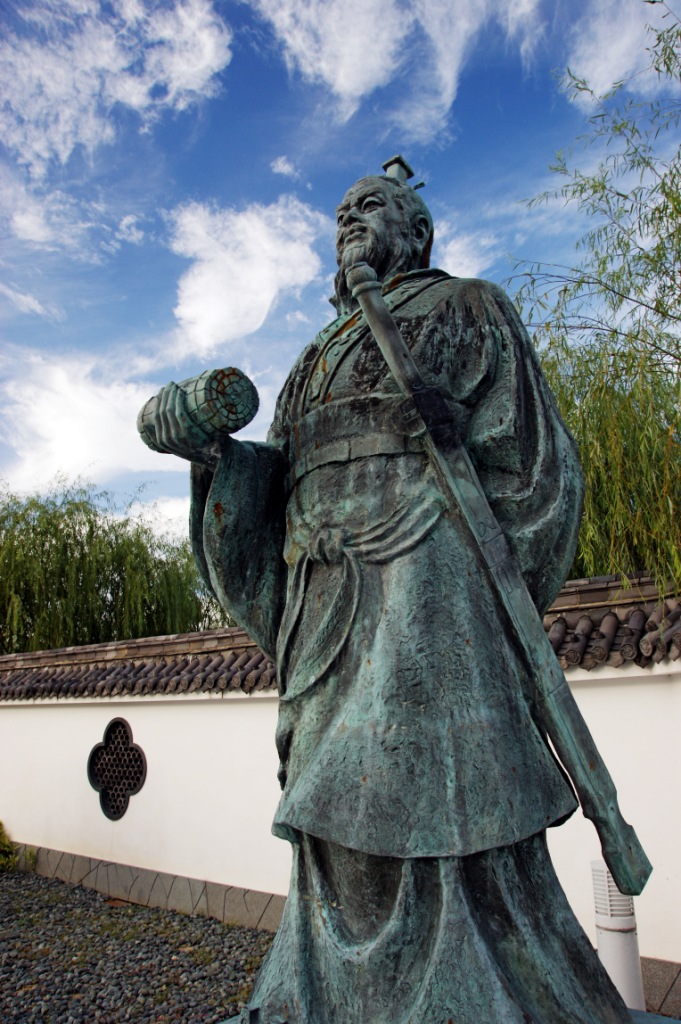Sun Tzu frasi celebri
“Il leone usa tutta la sua forza anche per uccidere un coniglio.”
L'arte della guerra
Frasi sulla guerra di Sun Tzu
“L'arte della guerra consiste nello sconfiggere il nemico senza doverlo affrontare.”
L'arte della guerra
Sun Tzu Frasi e Citazioni
L'arte della guerra
L'arte della guerra
L'arte della guerra
Sun Tzu: Frasi in inglese
Origine: The Art of War, Chapter XIII · Intelligence and Espionage
Variant translations
Hence to fight and conquer in all your battles is not supreme excellence; supreme excellence consists in breaking the enemy's resistance without fighting.
The best victory is when the opponent surrenders of its own accord before there are any actual hostilities... It is best to win without fighting.
Origine: The Art of War, Chapter III · Strategic Attack
Variant translations
A military operation involves deception. Even though you are competent, appear to be incompetent. Though effective, appear to be ineffective.
Origine: The Art of War, Chapter I · Detail Assessment and Planning
Lionel Giles translation
Origine: The Art of War, Chapter VI · Weaknesses and Strengths
“Secret operations are essential in war; upon them the army relies to make its every move.”
Origine: The Art of War, Chapter XIII · Intelligence and Espionage
“Where the army is, prices are high; when prices rise the wealth of the people is exhausted.”
Origine: The Art of War, Chapter II · Waging War
“Thus, what is of supreme importance in war is to attack the enemy's strategy.”
是故上攻伐谋
The Art of War, Chapter III · Strategic Attack
Variante: Thus, what is of supreme importance in war is to attack the enemy's strategy.
Origine: The Art of War, Chapter XI · The Nine Battlegrounds
Origine: The Art of War, Chapter IX · Movement and Development of Troops
Origine: The Art of War, Chapter III · Strategic Attack
Origine: The Art of War, Chapter I · Detail Assessment and Planning
Origine: The Art of War, Chapter VI · Weaknesses and Strengths
“There is no instance of a nation benefitting from prolonged warfare.”
Origine: The Art of War, Chapter II · Waging War
“Hold out baits to entice the enemy. Feign disorder, and crush him.”
Origine: The Art of War, Chapter I · Detail Assessment and Planning
“Management of many is the same as management of few. It is a matter of organization.”
Origine: The Art of War, Chapter V · Forces
Origine: The Art of War, Chapter V · Forces
Origine: The Art of War, Chapter XI · The Nine Battlegrounds
"If his forces are united, separate them" is also interpreted: "If sovereign and subject are in accord, put division between them."
Origine: The Art of War, Chapter I · Detail Assessment and Planning
“One defends when his strength is inadequate; he attacks when it is abundant.”
Origine: The Art of War, Chapter IV · Disposition of the Army
Translation by Lionel Giles
Origine: The Art of War, Chapter XII · Attacking with Fire
“To see victory only when it is within the ken of the common herd is not the acme of excellence.”
Origine: The Art of War, Chapter IV · Disposition of the Army
“Victory is reserved for those who are willing to pay its price.”
Attributed to Sun Tzu in multiple books and internet sites, but this text does not appear in The Art of War and seems to be a more recent creation.
Disputed
(zh-TW) 孫子曰:國之上下,死生之地,存亡之道,不可不察也。
The Art of War, Chapter 1 · Detail Assessment and Planning
Alternative translation: Subtle and insubstantial, the expert leaves no trace; divinely mysterious, he is inaudible. Thus he is master of his enemy's fate.
Alternative translation: O divine art of subtlety and secrecy! Through you we learn to be invisible, through you inaudible and hence we can hold the enemy's fate in our hands.
The Art of War, Chapter VI · Weaknesses and Strengths
Contesto: Be extremely subtle, even to the point of formlessness. Be extremely mysterious, even to the point of soundlessness. Thereby you can be the director of the opponent's fate.
“WANG XI Opponents cannot exhaust you.”
The Art of War: Complete Texts and Commentaries
Origine: The Art of War, Chapter VI · Weaknesses and Strengths
Origine: The Art of War, Chapter XI · The Nine Battlegrounds
“Opportunities multiply as they are seized.”
Sun Tzu among many other military thinkers and leaders believed in fate and determination from the correct application of theory, the state of the opponent's and one's own power, and a code for the general and a code for the soldier to follow, rather than the Machiavellian type of intuition that evokes an evolution of opportunism that brought great historical consequences as it dominated over the classical and medieval ethical doctrines. Thus this statement is contrary to Sun Tzu principles. Nevertheless, there is a possible relation to the quote: Quickness is the essence of the war.
Misattributed
